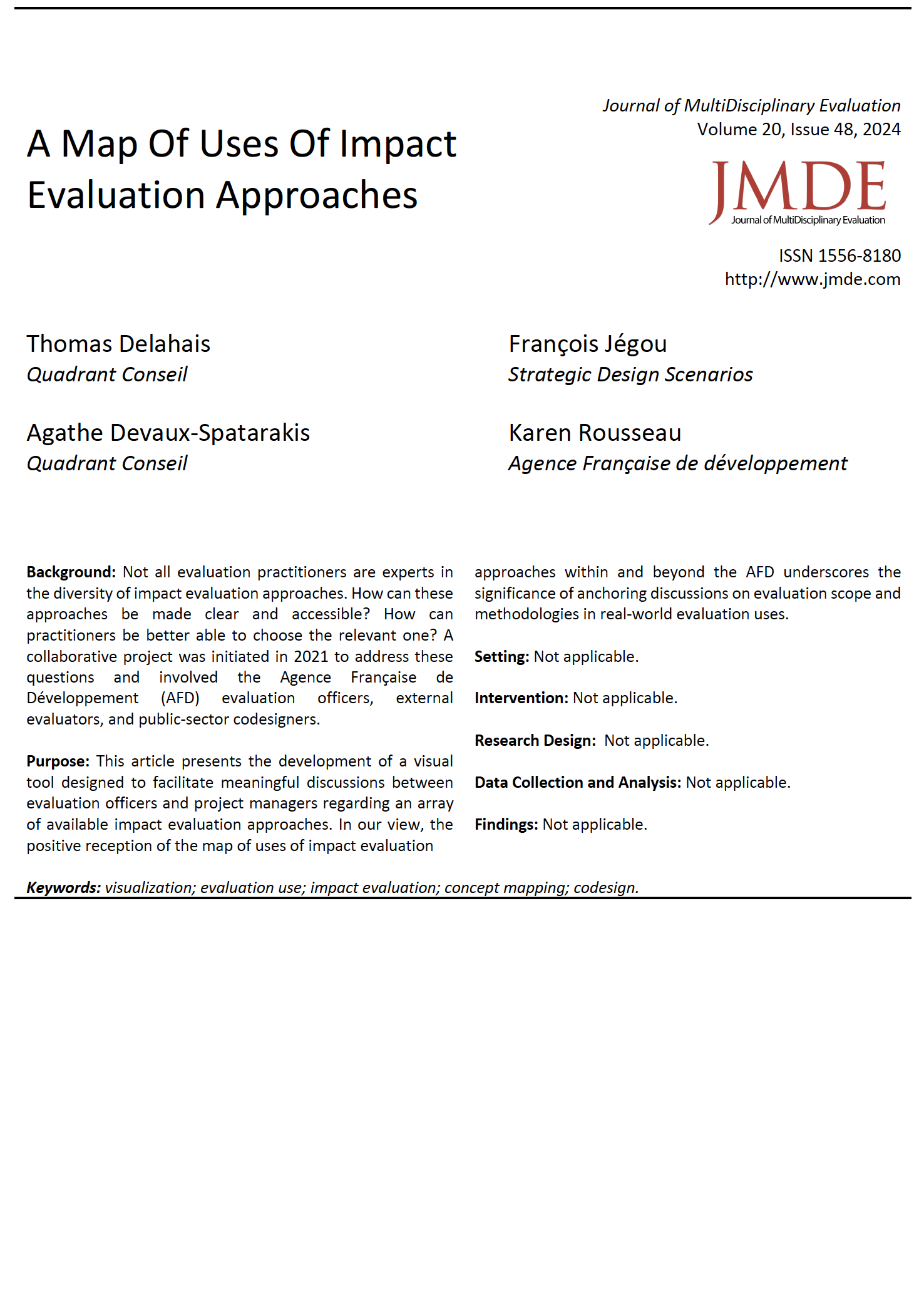A Map Of Uses Of Impact Evaluation Approaches
Main Article Content
Abstract
Background: Not all evaluation practitioners are experts in the diversity of impact evaluation approaches. How can these approaches be made clear and accessible? How can practitioners be better able to choose the relevant one? A collaborative project was initiated in 2021 to address these questions, and involved the French Development Agency’s evaluation officers, external evaluators, and public-sector co-designers.
Purpose: This article presents the development of a visual tool designed to facilitate meaningful discussions between evaluation officers and project managers regarding an array of available impact evaluation approaches. In our view, the positive reception of the map of uses of impact evaluation approaches within and beyond the Agence française de développement underscores the significance of anchoring discussions on evaluation scope and methodologies in real-world evaluation uses.
Setting: Not applicable.
Intervention: Not applicable.
Research design: Not applicable.
Data collection and analysis: Not applicable.
Findings: Not applicable.
Downloads
Article Details

This work is licensed under a Creative Commons Attribution-NonCommercial 4.0 International License.
Copyright and Permissions
Authors retain full copyright for articles published in JMDE. JMDE publishes under a Creative Commons Attribution-NonCommercial 4.0 International License (CC BY - NC 4.0). Users are allowed to copy, distribute, and transmit the work in any medium or format for noncommercial purposes, provided that the original authors and source are credited accurately and appropriately. Only the original authors may distribute the article for commercial or compensatory purposes. To view a copy of this license, visit creativecommons.org
References
Alkin, M. C., & King, J. A. (2017). Definitions of evaluation use and misuse, evaluation influence, and factors affecting use. American Journal of Evaluation, 38(3), 434‑–450. https://doi.org/10.1177/1098214017717015 DOI: https://doi.org/10.1177/1098214017717015
Bason, C. (2014). Design for policy (1st Ed.). Routledge.
Befani, B. (2020). Choosing appropriate evaluation methods tool. Centre for the Evaluation of Complexity Across the Nexus. https://www.cecan.ac.uk/wp-content/uploads/2020/11/Final_Choosing-Appropriate-Evaluation-Methods-1.pdf
Charancle, J.-M. B., Vielajus, M., & Simon, P. (2021). Évaluation de la politique d’évaluation de l’AFD (89; Ex-Post). Agence Française de Développement. https://www.afd.fr/fr/ressources/evaluation-de-la-politique-devaluation-de-lafd
Chelimsky, E. (2006). The purposes of evaluation in a democratic society. In I. Shaw, J. Greene, & M. Mark (Eds.), The Sage handbook of evaluation (p. 34–55). Sage Publications Ltd. https://doi.org/10.4135/9781848608078.n1 DOI: https://doi.org/10.4135/9781848608078.n1
Cornwall, A., & Eade, D. (Éds.). (2010). Deconstructing development discourse: Buzzwords and fuzzwords. Practical Action Publishing and Oxfam. https://oxfamilibrary.openrepository.com/bitstream/handle/10546/118173/bk-deconstructing-development-buzzwords-010910-en.pdf?sequence=1 https://doi.org/10.3362/9781780440095.001 DOI: https://doi.org/10.3362/9781780440095.000
Delahais, T., & Devaux-Spatarakis, A. (2022). Qu’attendre de la recherche pour éclairer l’action publique ? (229; Papiers de recherche). Agence Française de Développement. https://www.cairn.info/qu-attendre-de-la-recherche-pour-eclairer-l-action--1000000148971-page-1.htm
Delahais, T., Devaux-Spatarakis, A., & Jegou, F. (2022). Se redonner du choix dans les approches d’évaluation d’impact: Rapport de recherche-action. Agence Française de Développement.
Delahais, T., Gouache, C., & Vincent, S. (2019). Le design de l’action publique : Vers une hybridation entre culture design et culture de l’évaluation. Sciences du Design, 10(2), 83–89. https://doi.org/10.3917/sdd.010.0083 DOI: https://doi.org/10.3917/sdd.010.0083
Delahais, T., & Lacouette-Fougère, C. (2019). Try again. Fail again. Fail better. Analysis of the contribution of 65 evaluations to the modernisation of public action in France. Evaluation, 1(3), 1–18. https://doi.org/10.1177/1356389018823237 DOI: https://doi.org/10.1177/1356389018823237
Delahais, T. (2017). How can impact be evaluated? An impact evaluation approach tree. Quadrant Conseil. https://www.quadrant-conseil.fr/ressources/impacttree.html
Delahais, T., & Quadrant Conseil. (2022). External Evaluation of MOPAN 2015-2021. Multilateral Organisation Performance Assessment Network. https://www.mopanonline.org/aboutus/evaluations/items/MOPANEvaluation_Final_August_web%20(1).pdf
Delahais, T., & Toulemonde, J. (2017). Making rigorous claims in a real-life context: Has research contributed to sustainable forest management? Evaluation, 23(4), 370–388. https://doi.org/10.1177/1356389017733211 DOI: https://doi.org/10.1177/1356389017733211
Devaux-Spatarakis, A. (2020). Behind the scenes of evidence-based policy in France. In M. Palenberg & A. Paulson (Eds.), The realpolitik of evaluation: Why demand and supply rarely intersect. Routledge https://doi.org/10.4324/9781003005162 DOI: https://doi.org/10.4324/9781003005162-3
Euréval, & Delahais, T. (2010). Étude portant sur la contribution de la traduction à la société multilingue dans l’Union européenne. Commission eurpéenne – Direction générale de la traduction. Publications Office of the EU. https://op.europa.eu/fr/publication-detail/-/publication/7d0a5d03-5c81-44df-9861-430a3d1c535f
Mc Sween-Cadieux, E., Dagenais, C., Somé, D. T., & Ridde, V. (2019). A health knowledge brokering intervention in a district of Burkina Faso: A qualitative retrospective implementation analysis. PLOS ONE, 14(7), 1–21. https://doi.org/10.1371/journal.pone.0220105 DOI: https://doi.org/10.1371/journal.pone.0220105
Naudet, J.-D., Delarue, J., & Bernard, T. (2012). Évaluations d’impact : Un outil de redevabilité ? Les leçons tirées de l’expérience de l’AFD. Revue d’économie du développement, 20(4), 27–48. https://www.cairn.info/revue-d-economie-du-developpement-2012-4-page-27.htm https://doi.org/10.3917/edd.264.0027 DOI: https://doi.org/10.3917/edd.264.0027
Sage, K., Jegou, F., Gouache, C., & Honoré, V. (2017). Evalophobia. http://www.sustainable-everyday-project.net/evalophobia/
Stern, E., Stame, N., Mayne, J., Forss, K., Davies, R., & Befani, B. (2012). Broadening the range of designs and methods for impact evaluations: Report of a study commissioned by the Department for International Development (Working Paper No. 38). Department for International Development. https://www.oecd.org/derec/50399683.pdf https://doi.org/10.22163/fteval.2012.100 DOI: https://doi.org/10.22163/fteval.2012.100
Trochim, W. M. (1989). An introduction to concept mapping for planning and evaluation. Evaluation and Program Planning, 12(1), 1–16. https://doi.org/10.1016/0149-7189(89)90016-5 DOI: https://doi.org/10.1016/0149-7189(89)90016-5
Vaessen, J., Lemire, S., & Befani, B. (2020). Evaluation of international development interventions: An overview of approaches and methods. World Bank. https://doi.org/10.1596/34962 DOI: https://doi.org/10.1596/34962

